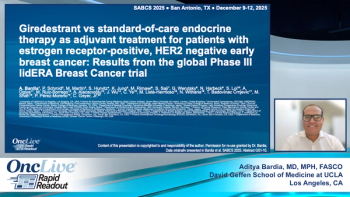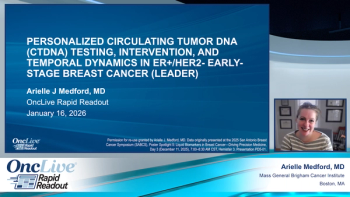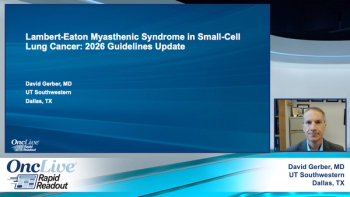
|Videos|March 8, 2022
Attainment of Early, Deep Prostate-Specific Antigen Response in mCSPC: A Comparison of Patients Initiated on Apalutamide or Enzalutamide
Expert urologist Benjamin Lowentritt, MD, reviews trial data comparing PsA response achieved with apalutamide versus enzalutamide in patients with castration-sensitive prostate cancer.
Advertisement
Background
- Studies have shown that men with metastatic castration-sensitive prostate cancer (mCSPC) continue to be treated with androgen deprivation therapy (ADT) alone despite evidence that next-generation androgen receptor inhibitors including apalutamide and enzalutamide demonstrate superior outcomes when used in combination with ADT.
- Rapid, deep, and durable reduction of prostate-specific antigen (PSA) in clinical trials of next-generation androgen receptor inhibitors is associated with increased probability of achieving progression-free and/or overall survival outcomes, with patients achieving a 90% or greater reduction in PSA from baseline (PSA90) having the greatest probability of long-term benefit.
- There are currently no data comparing real-world PSA outcomes among patients with mCSPC using next-generation androgen receptor inhibitors apalutamide or enzalutamide in the United States.
- The objective of this study was to compare the proportion of patients with a PSA90 response by 6 months and beyond for patients with mCSPC who were new users of apalutamide versus enzalutamide.
- The null hypothesis was no difference in the proportion of patients with mCSPC achieving a rapid, deep PSA90 response when treated with apalutamide or enzalutamide.
Methods
- This was a retrospective, longitudinal propensity score-weighted cohort study in patients with mCSPC who were initiated on apalutamide or enzalutamide.
- Patients were assigned to mutually exclusive treatment cohorts based on the first dispensation of apalutamide or enzalutamide.
- The index date was defined as the first dispensation of apalutamide or enzalutamide after December 16, 2019, the United States Food and Drug Administration (FDA) approval date for enzalutamide, which followed FDA approval of apalutamide on September 17, 2019.
- Baseline patient characteristics were evaluated in the 12 months preceding the index date.
- The observation period spanned from the index date to either index treatment discontinuation (using a 90-day treatment gap to define discontinuation), initiation of a different next-generation androgen inhibitor, the use of radiopharmaceuticals, the end of clinical activity (including death), or the end of data availability on March 5, 2021, whichever occurred first.
- Study outcomes included a proportion of patients who achieved a PSA90 response by 6 months post-index and time to a PSA90 response from the date of index treatment initiation.
- Inverse probability of treatment weighting based on the propensity score was used to account for differences in baseline characteristics between the apalutamide and enzalutamide cohorts.
Results and Conclusions
- Despite the potential for variation in real-world PSA testing patterns following treatment initiation, PSA testing frequency was similar between the apalutamide and enzalutamide cohorts.
- In this real-world study of patients with mCSPC, significantly more patients attained an early and deep PSA90 response when treated with apalutamide relative to enzalutamide.
- PSA90 response was attained significantly earlier in patients treated with apalutamide compared with patients treated with enzalutamide.
- The proportions of patients attaining a PSA90 response by 6 months and 12 months following initiation of apalutamide are consistent with those observed in the phase III TITAN study (NCT02489318) of apalutamide in patients with mCSPC.
- The clinical implications of these observations warrant further consideration given existing evidence on the association between attainment of rapid, deep, and durable PSA response with survival-related end points in patients treated with these medications.
Advertisement
Latest CME
Advertisement
Advertisement
Trending on OncLive
1
Single-Center, Retrospective Data Show Low Rate of Lifileucel Infusion Following Referral in Advanced Melanoma
2
Real-World Data Support Clinical Benefit With Lifileucel in Previously Treated Advanced Melanoma
3
Outcomes With Bridging Therapy Correlate With Cilta-Cel Efficacy, Safety in Multiple Myeloma
4
Long-Term Cilta-Cel Data Show Low Rates of PFS Events in Standard-Risk R/R Myeloma
5






































